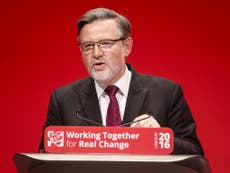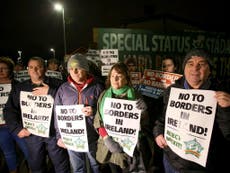Whisperings in Westminster tell me that both parties are about to change their Brexit strategies
May’s cabinet ministers are coming to realise that they could be even worse off if she leaves. Meanwhile, Labour is having to nail its colours to the mast

Something’s going on in each of the two main parties when it comes to Brexit.
On the one hand, Michel Barnier, the EU’s chief Brexit negotiator, said last week that there had been “little progress” since March, and that there was a “risk of failure”. On the other hand, events are forcing both the government and Labour to face up to the fact that neither of their positions on Brexit are sustainable. One senses the tectonic plates are moving. Why?
On the Conservative side, the prime minister proposed a hard Brexit to the British people at last year’s election and consequently she lost her majority.
Jacob Rees-Mogg and the shadowy European Research Group (ERG) may still want a Brexit in which the UK has no involvement in the economic structures – the customs union and single market – of the EU, nor its agencies or its rules and regulations (what they call “a clean break”), but the election demonstrated there was insufficient support in the country for that model. And the resulting arithmetic in the House of Commons means there aren’t the votes to get such a proposition through.
Unfortunately, Theresa May’s first priority is to retain her office; everything else – including the national interest – is secondary. She is petrified that if she does not dance to the tune of the ERG, then they will precipitate a leadership contest.
However, if a vote of confidence were triggered before Brexit is due in March 2019, most Tory MPs I speak to – on both sides of the Brexit divide – believe she would win, because there is no desire to change leaders beforehand and they cannot agree on who her successor should be.
Indeed, she would be well advised to follow the example of a former prime minister, John Major. Like May, Major faced constant aggro from the Tory hard right over Europe, with constant rumours of a possible leadership challenge in the 1990s.
Finally, in June 1995, he resigned as Tory leader but not as prime minister, challenging his detractors to “put up or shut up”. The only person to challenge him was John Redwood, the then-Welsh secretary (and now part of the ERG), who ended up receiving 27 per cent of votes against Major’s 66 per cent. I hazard a guess that should Jacob Rees-Mogg or Boris Johnson do the same today, they would suffer the same fate as Redwood.
I put this idea to a sitting senior cabinet minister last month – a May loyalist – who thought the suggestion had some merit, if only for the prime minister to reassert her authority over her cabinet. This cabinet minister made the observation that every Tory leader since Major had failed to learn that the hard Brexit right of the Tory parliamentary party will never be satisfied, so there is no point throwing them red meat in the hope of sating their appetite.
The penny is also beginning to drop with the hard right themselves on the parliamentary arithmetic issue. One leading figure in the ERG – a former minister under May – told me last week that they know changing the leader may make matters worse. If one of their own were to succeed May, this ERG stalwart acknowledged they are less likely to be able to marshal the votes for the extreme Brexit they seek.
On the Labour side, our demand that May’s Brexit deal deliver the exact same benefits as the single market and customs union lacks credibility (as I’ve written before), so long as our front bench refuses to sign up to a policy that seeks to ensure the UK continues to participate in both. Barry Gardiner, our shadow international development secretary, trotted out the usual line that it is legitimate to set such a test given it was the Tory Brexit secretary David Davis who promised it (since when did we allow Davis to write Labour’s policies?).
His line of argument ran into choppy waters on BBC1’s Andrew Marr Show given Barry himself is on the record pointing out the contradiction in our position.
The Lewisham East constituency Labour Party has just selected our parliamentary candidate in the by-election to succeed the wonderful Heidi Alexander, who is to become London’s deputy mayor for transport. Our new candidate, Janet Daby, could not be clearer about her position: “I will always put the interest of our community first. I believe we should stay in both the single market and customs union.”
This is not the position of the front bench but, if she is elected, it is clear she would vote for (as will I) Lord Alli’s cross-party amendment to ensure the UK continues to participate in the single market through the European Economic Area (EEA) when the EU (Withdrawal) Bill comes back to the Commons for consideration.
The principal excuse now cited by our front bench for not supporting UK membership of the EEA is that it will turn us from a rule-maker, with a vote on the European Council on EEA rules, to a rule receiver. This is not strictly accurate.
EEA members sit on the committees that draw up EEA rules which we will, in any event, have to comply with if selling into the EU market under a free trade agreement (which Labour says is its goal). If non-EU members of the EEA unanimously wish not to apply the rules in their countries, they may choose to do so. So less a rule receiver, more a rule shaper.
Also, if we joined the EEA the notion that it would stay the same is unlikely. As Lord John Kerr, the former permanent under secretary of the Foreign Office, has argued, the EEA is not a perfect model – but a different more powerful EEA would emerge if we were part of it. This is no doubt why the Norwegian Prime Minister has said: “I think we will cope very well if the Brits come in. It will give bargaining power on our side too.”
Above all, the Irish border issue is bringing matters to a head. Both main parties say unequivocally they wish to ensure there is no hard border on the island of Ireland. To achieve that – as I’ve set out before – we will need to continue to participate in the customs union and the EEA, in the absence of any alternative solution.
The UK government in affect agreed to this at the December European Council, but has since tried to backtrack. But the Irish government is clear it will enforce this commitment and if necessary will veto any Brexit deal which does not adhere to it.
The British government so far has believed the Irish government’s position to be a bargaining ploy. Increasingly though, UK ministers recognise that our Irish partners and friends mean what they say. One only needs to read the new Queen’s University Belfast report out today into public attitudes to Brexit in Northern Ireland to see why.
That report found “substantial and intense opposition to possible north-south border checks between Northern Ireland and the Republic of Ireland, and to east-west border checks between Northern Ireland and Great Britain”. Across those who voted both Leave and Remain, “there are strong expectations that protests against either north-south or east-west border checks would quickly deteriorate into violence”.
The report concludes that a majority in both Catholic and Protestant communities want a Brexit “that would largely eliminate the need for any such north-south or east-west checks, namely for the UK as a whole to remain in the customs union and single market”. This necessitates both the Tories and Labour changing position.
As each week goes by it is ever clearer that the Brexit staring us in the face in 2018 is very different from that which was envisaged – it all lends further weight to calls for a people’s vote on the Brexit deal.
Love conquers all
So... did you watch the wedding? We certainly did in my household! It should not matter but, for a family like mine, it does.
When I was growing up in Streatham, even in our diverse borough of Lambeth, our mixed heritage family was unusual. My mother is half English and half Irish; my late father was Nigerian (Igbo to be precise!). I’ve felt lucky to be comfortable and at ease with all my cultures when, too often, others seek to force you to choose between them.
Therefore, to see two people in our royal family of different backgrounds fall in love is particularly poignant and a cause for celebration. In this context, we should be able to say this without feeling the obligatory need to denounce the hereditary principle and our monarchy, or to go to great lengths to explain that even raising the race issue in this context is not to illustrate one has a chip on one’s shoulder.
The bottom line is that its just great to see two people – like my parents – from different cultures come together.
When my parents got married in the late 1970s, many wondered how it was possible for a union between two people of different ethnicities to work – now we don’t think to question it because, as Bishop Michael Curry said in his wonderful and poetic address at the wedding, “There is power in love. Don’t underestimate it. Don’t even oversentimentalise it. There is power, power in love.”
Chuka Umunna is Labour MP for Streatham





Join our commenting forum
Join thought-provoking conversations, follow other Independent readers and see their replies